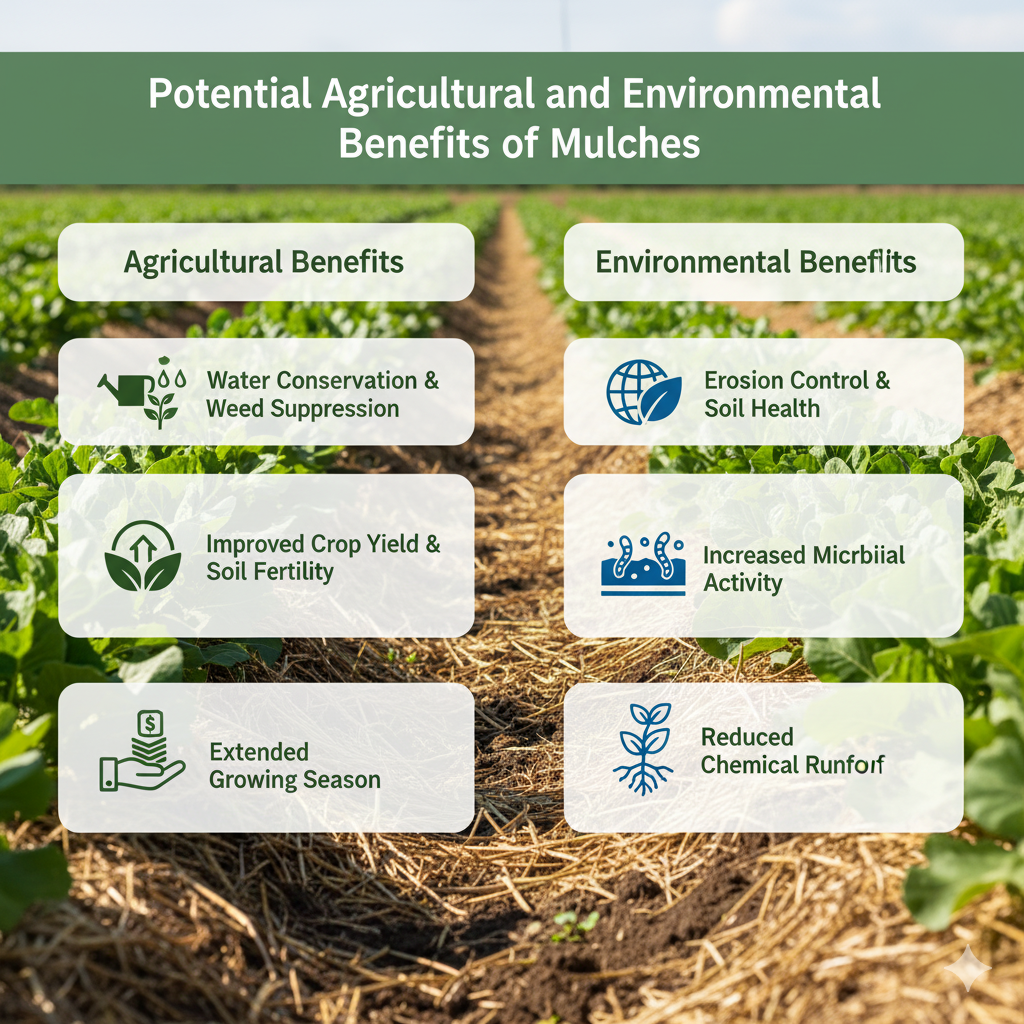In modern agriculture, farmers are constantly looking for ways to improve soil health, boost crop yield, and reduce environmental impact. One simple yet powerful solution lies in mulching — a practice that offers immense environmental benefits of mulches while also improving farm productivity.
Mulches act as a protective layer over the soil, conserving moisture, controlling weeds, and regulating temperature. Whether organic or synthetic, mulch films have become an essential part of sustainable farming systems worldwide.
What Are Mulches and Why Are They Important?
Mulches are materials applied over the soil surface to cover and protect it from external factors such as heat, rain, and evaporation. They can be organic (like straw, compost, or leaves) or inorganic (like plastic mulch films).
In agriculture, mulch films are particularly effective because they:
- Reduce water loss through evaporation.
- Maintain consistent soil temperature.
- Suppress weed growth.
- Minimize soil erosion.
- Improve crop quality and yield.
The environmental benefits of mulches extend far beyond the farm — they help in reducing carbon footprints, improving soil biodiversity, and conserving natural resources.
1. Soil Moisture Conservation: A Key Environmental Benefit of Mulches
One of the most significant environmental benefits of mulches is water conservation. In regions where irrigation resources are limited, mulching helps retain soil moisture by reducing evaporation.
How Mulches Help Conserve Water
- The mulch layer acts as a barrier, preventing direct exposure of soil to sunlight.
- It slows down water loss, allowing plants to access moisture for longer durations.
- Farmers report up to 25–40% water savings when using mulch films compared to uncovered fields.
This makes mulching a sustainable choice in water-scarce areas, directly contributing to environmental preservation and efficient resource use.
2. Temperature Regulation and Soil Protection
Soil temperature plays a vital role in crop growth and microbial activity. Mulches — especially plastic mulch films — help regulate temperature by insulating the soil.
Benefits of Temperature Regulation
- Keeps the soil warmer during cold seasons and cooler in extreme heat.
- Encourages root development and nutrient absorption.
- Protects soil structure from sudden weather changes.
This stable environment benefits both plants and beneficial soil organisms, strengthening the natural ecosystem beneath the surface.
Companies like Brownfield India, a renowned mulch film manufacturer in Indore, design advanced films that offer superior thermal regulation for different climatic zones in India.
3. Weed Control and Reduced Chemical Dependency
Another major environmental benefit of mulches is effective weed suppression. Mulch films block sunlight, preventing weed seeds from germinating.
Why This Matters for the Environment
- Reduced need for herbicides or chemical weed control.
- Lower chemical runoff into nearby water sources.
- Healthier soil and safer crops for consumers.
By limiting the use of harmful agrochemicals, mulching supports cleaner and greener agricultural systems — aligning with the global push for sustainable farming practices.
4. Soil Health and Erosion Prevention
Healthy soil is the foundation of sustainable farming. However, exposure to wind, rain, and excessive tillage often leads to erosion and nutrient loss. Mulches provide a protective cover that shields the soil from these damaging factors.
How Mulching Improves Soil Health
- Prevents loss of topsoil during heavy rains.
- Encourages microbial activity and earthworm growth.
- Reduces soil compaction and crust formation.
- Adds organic matter (in case of biodegradable mulches).
This protection not only maintains soil fertility but also promotes carbon sequestration — a critical process in combating climate change.
Brownfield India, as a leading mulch film supplier in Indore, emphasizes eco-friendly films that support long-term soil conservation.
5. Enhanced Crop Yield and Quality
While the environmental advantages are clear, mulching also translates to economic and agricultural gains. Crops grown with mulch films generally produce higher yields and better quality fruits and vegetables.
Practical Benefits for Farmers
- Consistent moisture levels reduce crop stress.
- Fewer weeds mean healthier, faster-growing plants.
- Cleaner produce with minimal soil contact.
Over time, this leads to increased profitability, making mulch adoption both an environmentally sustainable and financially smart choice.
6. Reduction of Carbon Footprint and Sustainable Farming
The environmental benefits of mulches go beyond immediate soil and crop benefits — they also reduce the overall carbon footprint of farming operations.
How Mulching Contributes to Sustainability
- Requires less frequent irrigation and tillage.
- Minimizes use of chemical fertilizers and herbicides.
- Promotes efficient use of energy and resources.
Advanced biodegradable mulch films are now being developed by innovative mulch film manufacturers like Brownfield India, helping farmers transition to eco-safe alternatives that decompose naturally without harming the environment.
7. Role of Mulch Films in Climate-Resilient Agriculture
With unpredictable weather patterns becoming more common due to climate change, mulch films play a vital role in creating climate-resilient farming systems.
Key Benefits in Climate Adaptation
- Prevents soil cracking during droughts.
- Maintains optimal growing conditions despite temperature fluctuations.
- Reduces flood-related damage by minimizing soil erosion.
These properties make mulches a powerful tool for Indian farmers who face irregular monsoons and dry spells.
By partnering with a mulch manufacturing company in Indore like Brownfield India, farmers can access high-quality, UV-stabilized mulch films designed for local climatic conditions.
8. Economic and Environmental Balance Through Mulching
The concept of sustainable agriculture revolves around finding a balance between productivity and ecological safety. Mulching fits perfectly within this balance.
Dual Benefits of Mulching
- Economic: Increases yield, reduces input costs, and enhances produce quality.
- Environmental: Conserves water, reduces erosion, and limits chemical pollution.
As one of the top Mulch Film Manufacturers & Traders in India, Brownfield India promotes this harmony by producing reliable, long-lasting mulch films that contribute to both farm prosperity and environmental protection.
9. Choosing the Right Mulch Film for Maximum Benefits
Selecting the correct mulch film depends on the type of crop, soil, and climate. High-quality films ensure better results and longer durability.
Tips to Choose the Best Mulch Film
- Thickness and Color: Black, silver, and white mulch films serve different purposes for heat absorption or reflection.
- Material Quality: Go for UV-stabilized and tear-resistant films.
- Eco-Friendliness: Choose biodegradable or recyclable options for reduced waste.
Brownfield India provides customized solutions as a trusted mulch manufacturing company in Indore, offering different grades and specifications tailored for vegetables, fruits, and horticultural crops.
10. The Future of Sustainable Farming with Mulches
As environmental awareness grows, the agricultural industry is moving toward greener practices. The next generation of mulch films includes biodegradable, reflective, and compostable materials that combine performance with environmental responsibility.
Brownfield India continues to lead this transformation, developing innovative mulch products that:
- Reduce plastic waste.
- Support circular economy goals.
- Help farmers adopt eco-conscious farming techniques without compromising yield.
The environmental benefits of mulches will play a key role in shaping the future of Indian agriculture — ensuring food security while safeguarding nature.
Frequently Asked Questions (FAQ)
Q1. What are the main environmental benefits of mulches?
Mulches conserve water, prevent soil erosion, suppress weeds, reduce the need for chemicals, and improve soil biodiversity — making farming more sustainable.
Q2. Are mulch films environmentally friendly?
Yes, especially when using biodegradable or recyclable films made by reputed manufacturers like Brownfield India.
Q3. How do mulches reduce irrigation needs?
They slow down evaporation and maintain soil moisture, allowing crops to thrive with less frequent watering.
Q4. Can mulch films be used in all types of crops?
Yes, mulch films are suitable for a wide range of crops, including vegetables, fruits, and ornamental plants.
Q5. Where can I find reliable mulch film suppliers in Indore?
You can contact Brownfield India, one of the leading mulch film suppliers in Indore, for premium-quality films tailored to your crop and soil type.
Conclusion: Adopting Mulches for a Greener, More Productive Future
The environmental benefits of mulches are undeniable — from conserving water and protecting soil to reducing chemicals and enhancing crop quality. As agriculture faces growing challenges like climate change and soil degradation, mulching offers a simple, cost-effective, and eco-friendly solution.
With the support of trusted partners like Brownfield India, a reputed mulch film manufacturer and trader in Indore, farmers can take a big step toward sustainable and profitable agriculture — protecting both their crops and the planet.






